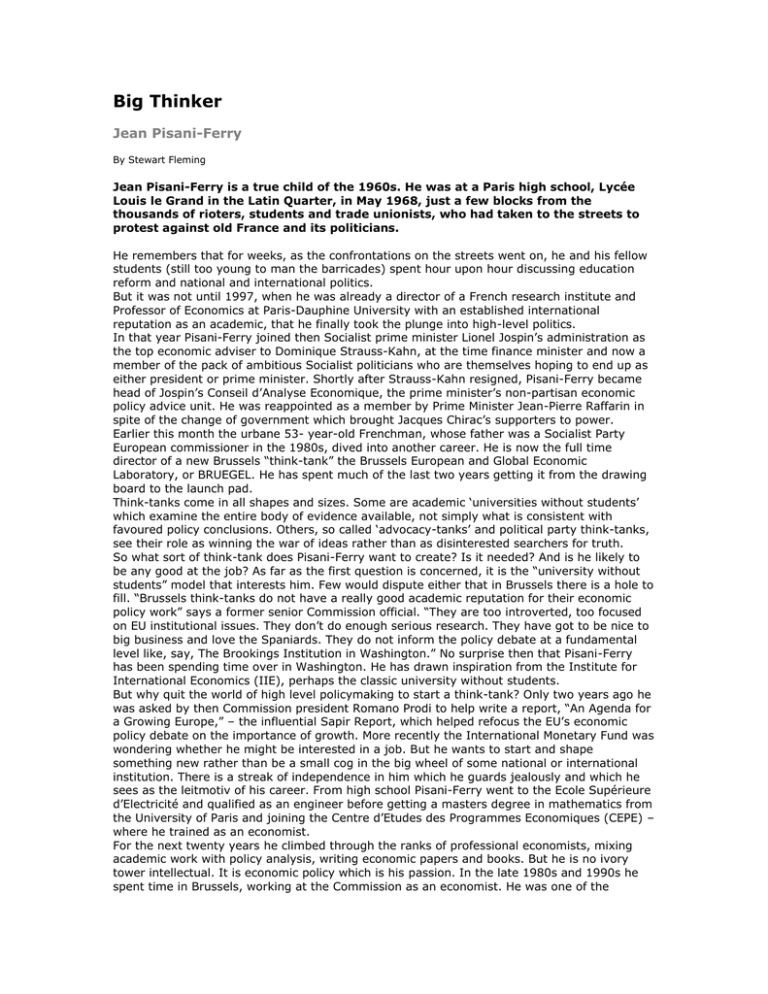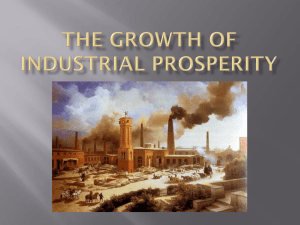
Big Thinker
Jean Pisani-Ferry
By Stewart Fleming
Jean Pisani-Ferry is a true child of the 1960s. He was at a Paris high school, Lycée
Louis le Grand in the Latin Quarter, in May 1968, just a few blocks from the
thousands of rioters, students and trade unionists, who had taken to the streets to
protest against old France and its politicians.
He remembers that for weeks, as the confrontations on the streets went on, he and his fellow
students (still too young to man the barricades) spent hour upon hour discussing education
reform and national and international politics.
But it was not until 1997, when he was already a director of a French research institute and
Professor of Economics at Paris-Dauphine University with an established international
reputation as an academic, that he finally took the plunge into high-level politics.
In that year Pisani-Ferry joined then Socialist prime minister Lionel Jospin’s administration as
the top economic adviser to Dominique Strauss-Kahn, at the time finance minister and now a
member of the pack of ambitious Socialist politicians who are themselves hoping to end up as
either president or prime minister. Shortly after Strauss-Kahn resigned, Pisani-Ferry became
head of Jospin’s Conseil d’Analyse Economique, the prime minister’s non-partisan economic
policy advice unit. He was reappointed as a member by Prime Minister Jean-Pierre Raffarin in
spite of the change of government which brought Jacques Chirac’s supporters to power.
Earlier this month the urbane 53- year-old Frenchman, whose father was a Socialist Party
European commissioner in the 1980s, dived into another career. He is now the full time
director of a new Brussels “think-tank” the Brussels European and Global Economic
Laboratory, or BRUEGEL. He has spent much of the last two years getting it from the drawing
board to the launch pad.
Think-tanks come in all shapes and sizes. Some are academic ‘universities without students’
which examine the entire body of evidence available, not simply what is consistent with
favoured policy conclusions. Others, so called ‘advocacy-tanks’ and political party think-tanks,
see their role as winning the war of ideas rather than as disinterested searchers for truth.
So what sort of think-tank does Pisani-Ferry want to create? Is it needed? And is he likely to
be any good at the job? As far as the first question is concerned, it is the “university without
students” model that interests him. Few would dispute either that in Brussels there is a hole to
fill. “Brussels think-tanks do not have a really good academic reputation for their economic
policy work” says a former senior Commission official. “They are too introverted, too focused
on EU institutional issues. They don’t do enough serious research. They have got to be nice to
big business and love the Spaniards. They do not inform the policy debate at a fundamental
level like, say, The Brookings Institution in Washington.” No surprise then that Pisani-Ferry
has been spending time over in Washington. He has drawn inspiration from the Institute for
International Economics (IIE), perhaps the classic university without students.
But why quit the world of high level policymaking to start a think-tank? Only two years ago he
was asked by then Commission president Romano Prodi to help write a report, “An Agenda for
a Growing Europe,” – the influential Sapir Report, which helped refocus the EU’s economic
policy debate on the importance of growth. More recently the International Monetary Fund was
wondering whether he might be interested in a job. But he wants to start and shape
something new rather than be a small cog in the big wheel of some national or international
institution. There is a streak of independence in him which he guards jealously and which he
sees as the leitmotiv of his career. From high school Pisani-Ferry went to the Ecole Supérieure
d’Electricité and qualified as an engineer before getting a masters degree in mathematics from
the University of Paris and joining the Centre d’Etudes des Programmes Economiques (CEPE) –
where he trained as an economist.
For the next twenty years he climbed through the ranks of professional economists, mixing
academic work with policy analysis, writing economic papers and books. But he is no ivory
tower intellectual. It is economic policy which is his passion. In the late 1980s and 1990s he
spent time in Brussels, working at the Commission as an economist. He was one of the
authors – together with Centre for European Policy Studies director Daniel Gros and
Commission President José Manuel Barroso’s deputy head of cabinet Alexander Italianer – of
the ‘One Market, One Money’ report. A colleague remembers that he also produced an
excellent report on Russia. He became an adjunct professor at the Université Libre de
Bruxelles, and Professor at the Ecole Polytechnique in Paris.
The events of 1968 left their impression. Like his father who was a leftist minister in Charles
de Gaulle’s government in the 1960s before jumping ship to the Socialist Party, Pisani-Ferry’s
sympathies too have been consistently to the centre left.
But he did not want to tread directly in his father’s footsteps or make a career clinging to the
coattails of this or that politician. Hence the wait until 1997 before taking a top government
post. While his sympathies are to the left, he tries to make sure that they do not interfere with
his intellectual analysis – that streak of independence again.
In the late 1990s he courted controversy, particularly amongst fellow Socialists. He argued
that the job creating policy of the 35 hour week which Socialist minister of labour Martine
Aubry, the daughter of former commission president Jacques Delors, had sponsored, no longer
answered the nation’s needs. Drawing on the ‘Anglo-Saxon’ experience, despised in France, he
argued for the government to embrace the idea of an employment tax credit to encourage the
low paid to take jobs, and not, he insists, “workfare”.
Times had changed. France’s labour market was tightening. Ensuring the availability of
adequate labour was, he believed, one of the main long-term challenges facing France. The
Left dubbed him “a Milton Friedman follower”, evoking the reputation of one of America’s most
right-wing, and most distinguished economists. His reaction? “Tant Pis.” The analysis was
correct. It is the same with his political contacts. He retains his independence. Although his
first top government posting was working for Strauss-Kahn, he maintains good relations with
other key figures in the French Socialist Party, including François Hollande, not allowing
himself to become identified solely with the clique which owes its loyalty, and its hopes of
office, to Strauss-Kahn. “He [Pisani-Ferry] is a very serious economist and a very useful
person to have around because he has such great breadth of experience coupled with very,
very strong analytical skills,” says a former EU official who worked with him in the halcyon
days of Delors. “He is one of the most original and creative thinkers in France, not only on
economic policy but also on the future of Europe,” says Charles Grant, founder and director of
the Centre for European Reform in London.
Few doubt that BRUEGEL will succeed. Pisani-Ferry has used his reputation to persuade twelve
EU governments to take part, including France, Germany and even Britain (he is close to Ed
Balls, formerly Chancellor Gordon Brown’s top economic adviser). Eighteen multi-national
companies have also agreed to contribute to the think-tank’s H2 million a year budget. Mario
Monti, another formidable intellect, is on board as chairman. Pisani-Ferry is determined to
steer clear of the institutional navel-gazing which pre-occupies so much of Brussels and its
think-tanks. “The EU is a global player with global responsibilities. We will seek to bring a
European perspective to global issues and a global perspective to EU issues,” he says. Not a
bad mission statement.
Biography
1951: Born Boulogne-Billancourt, France
1977: Graduates from centre d’etudes des programmes économiques, Paris
1992-97: Director of the Centre d'études prospective et d'information internationales
(CEPII)
2000-01: President of the French prime minister's Economic Advisory Council
2001:- Professor of economics at Université de Paris-Dauphine
2003: Co-author An Agenda for a Growing Europe, (the Sapir report)
2002-04: Senior adviser to the director of the French ministry of finance
2005:- Director, Brussels European and Global Economic Laboratory (BRUEGEL)
© Copyright 2005 The Economist Newspaper Limited. All rights reserved.





